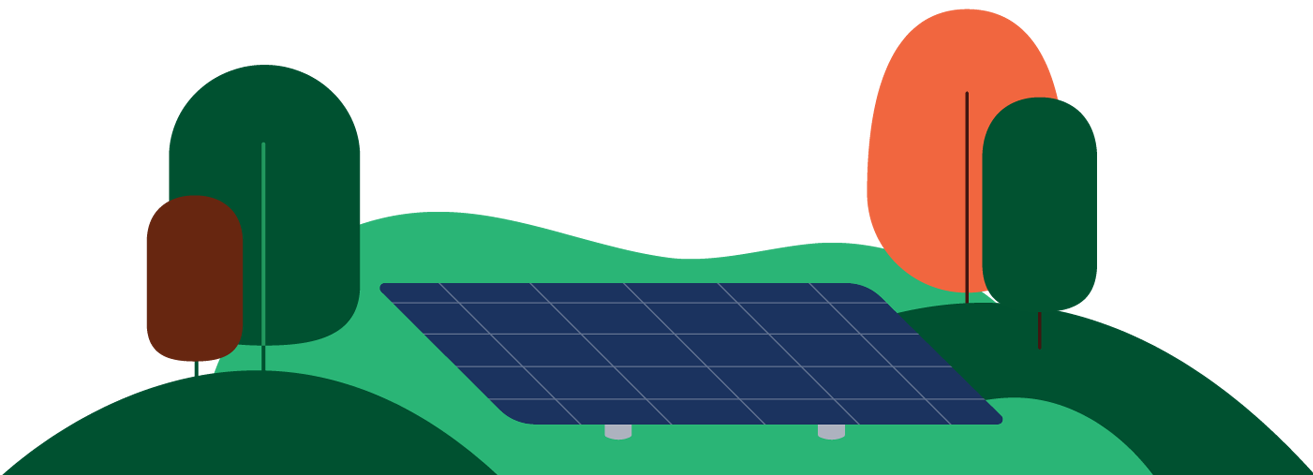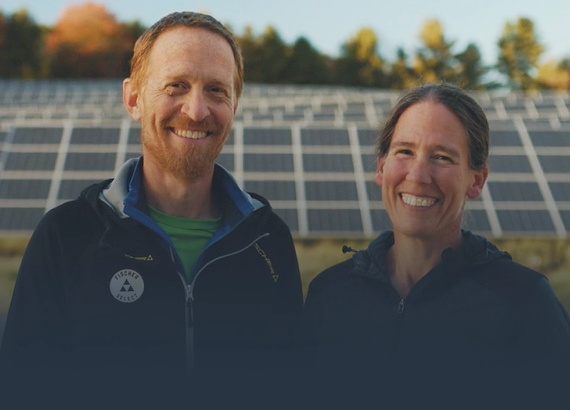Save 15% on electricity costs*
- No rooftop panels
- No sign-up fees
- No long-term contracts
- No cancellation fees


Community solar in Maine is a subscription-based service that enables Versant Power and Central Maine Power customers, residents and businesses alike, to tap into clean, renewable energy. Maine community solar programs leverage local, large-scale solar arrays sited throughout The Pine Tree State, which generate clean energy for the local power grid. Mainers who subscribe to these solar farms see annual electricity cost savings on their Versant or CMP bills, while the grid is supported by an influx of clean, renewable energy.

Nexamp currently has community solar projects in the Central Maine Power (CMP) and Versant Power utility service territories. Residents who get their power from CMP or Versant can subscribe to a Nexamp community solar farm and save 15% annually on their electricity costs without changing electricity providers. Low-to-moderate income subscribers may be eligible for a higher discount of 20%. Get in touch to see if you qualify! A subscription to a Nexamp community solar farm allows Mainers to receive credits on their bill for the energy produced by their share of the project, saving them up to 15% on electricity costs (note: excludes minimum delivery service charge).



Sign up to claim your spot
Provide some basic information and your utility account details.
Get assigned to a farm
As soon as a spot opens up, we’ll add you to a farm. We’ll subscribe you to the right amount of solar shares based on your electricity needs.
Save on electricity costs
You’ll get a discount on your utility bill in the form of credits. Pay Nexamp for these credits at a discount, helping you save.


When considering which solar solution might be right for you, it's important to understand the differences between community solar and rooftop solar. The table below breaks down the key differences between these two options.
| Nexamp Community Solar | Maine Rooftop Solar | |
| Upfront cost | No upfront cost | High upfront cost |
| Cost savings | Lower long-term savings | Higher long-term savings |
| Maintenance | No maintenance required; farms are maintained by Nexamp | Homeowner is responsible for all maintenance |
| Accessibility | Available to renters and homeowners | Available only to homeowners with a suitable roof |
| Tax incentives | Subscribers are not eligible for solar tax incentives | Tax incentives are available |
|
Property value impact |
No impact on property value for subscribers | Can help increase property value |










Nexamp Community Solar doesn’t require a credit check to enroll, there are no upfront costs, and there is no fee to cancel. We make it easy for homeowners, renters, non-profits, and others to participate in our Community Solar program and save 15% on their annual electricity costs.
Maine passed its initial community solar legislation in 2009, so the state is no stranger to these shared solar programs. Between 2009 and 2019, there were several policy challenges standing in the way of significant expansion. This finally shifted in 2019 when An Act to Promote Solar Energy Projects and Distributed Generation Resources in Maine was passed, enabling community solar growth and expansion in the state. This legislation encouraged the development of solar energy across the state with programs to broaden opportunities for residential and non-residential consumers to tap into the benefits of rooftop and community solar.
The Act was a game-changer for solar development in the state. It modernized net metering by eliminating a 10-meter cap on community solar projects across most of the state, increasing allowable net metering project size from 660 kW to under 5 MW, and creating a net metering program specifically for commercial and institutional customers.
Project participation in solar can either be through the newly established Distributed Generation (DG) procurement, or through Net Energy Billing (NEB) outside of the procurements.
The NEB program allows customers to offset their electricity bills using the energy generated from renewable energy projects, like community solar farms. Residential, commercial, and industrial customers can own their own projects or share in a project with other participants. Under NEB, there are two programs:
In 2024, Maine received a $62 million grant from the United States Environmental Protection Agency (EPA), under the “Solar for All” program. Supported by the Inflation Reduction Act, this grand is a significant forward step for access to solar in Maine. The program is particularly focused on low-income households, aiming to reduce energy costs and increase access to clean energy technologies, including rooftop and community solar projects, as well as energy storage solutions.
This program is helping to ensure that the benefits of solar energy are available to all by lowering barriers to solar adoption. The program also enables local job growth and economic development within clean energy.
Take advantage of the growth accessibility of community solar in Maine! When you sign up for community solar, you support the generation of clean, renewable energy while realizing annual electricity cost savings.
Community solar in Maine is a subscription-based service that enables Versant Power and Central Maine Power customers, residents and businesses alike, to tap into clean, renewable energy. Maine community solar programs leverage local, large-scale solar arrays sited throughout The Pine Tree State, which generate clean energy for the local power grid. Mainers who subscribe to these solar farms see annual electricity cost savings on their Versant or CMP bills, while the grid is supported by an influx of clean, renewable energy.